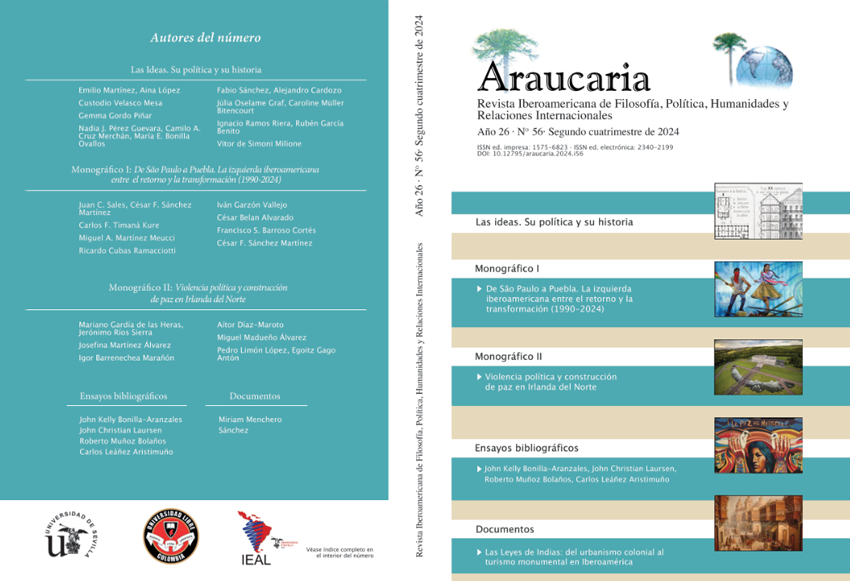Tres formas de atender y entender la violencia política en Irlanda del Norte: Agenda oculta (1990), En el nombre del Padre (1993) y En el nombre del hijo (1996)
Three ways of addressing and understanding political violence in Northern Ireland: Hidden Agenda (1990), In the Name of the Father (1993) and Some Mother’s Son (1996)
DOI:
https://doi.org/10.12795/araucaria.2024.i56.17Palavras-chave:
Cine, Irlanda del Norte, violencia política, terrorismoResumo
La producción cinematográfica constituye una fuente primaria en la construcción del conocimiento histórico, aunque la aprobación de sus aportaciones es muy reciente y coincide con la renovación de las técnicas de investigación en los análisis historiográficos que desbordan la primacía documental de los textos escritos. La relevancia potencial del cine en los estudios sociales está avalada por su condición primaria, la cual ejemplifica un “medio internacional de masas”. Partiendo de esta premisa, este trabajo intenta analizar y problematizar diferentes miradas que rompen con la tradicional aproximación predominante al conflicto político norirlandés en el cine. Al respecto, Agenda Oculta, En el nombre del padre y En el nombre del hijo son tres producciones cinematográficas que ofrecen diferentes maneras de atender y entender categorías polisémicas que son problemáticas en la comprensión de la realidad política del Ulster, tal y como sucede con la democracia, la justica, la violencia, el terrorismo o los derechos humanos.
Downloads
##plugins.generic.paperbuzz.metrics##
Referências
Baker, S. (2016). Victory doesn’t always Look the Way other People Imagine It.’ Post-conflict Cinema in Northern Ireland. En Y. Tzioumakis y C. Molloy (eds.), The Routledge Companion to Cinema and Politics. Nueva York: Routledge, pp. 175-185
Bardon, J. (1992). A History of Ulster. Belfast: Blackstaff Press.
Barrenetxea, I. (2006). Pensar la Historia desde el cine. Entelequía, núm. 1, 99-107
Barrenetxea, I. (2019). La «niña bonita». Imágenes de la violencia (y no violencia) de la Segunda República española en el cine. Historia contemporánea, núm. 59, 235-267
Craig, T. (2014). Monitoring the Peace? Northern Ireland’s 1975 Ceasefire Incident Centres and the Politicisation of Sinn Féin. Terrorism and Political Violence, 26(2), 307-319
Crusells, M. (2000). La guerra civil española: cine y propaganda. Barcelona: Ariel
Díaz Maroto, A. (2020). Los inicios del cine sobre el conflicto en Colombia: Guerrillas, ‘la violencia’ y una interpretación del pasado particular. Historia Actual Online, núm. 52, 35-44
Díaz Maroto, A. (2022). Luces, cámara y… ¡fuego!: la violencia política del País Vasco y Colombia en el cine de ficción: 1964-2017. Madrid: Sílex
Donnelly, K. (2000). The Policing of Cinema: Troubled film exhibition in Northern Ireland. Historical Journal of Film, Radio and Television, 20(3), 385-396
Ferraresi, Franco (1996). Threats to Democracy: The Radical Right in Italy after the War. Nueva Jersey: Princeton University Press
Ferro, M. (2000). Historia contemporánea y cine. Barcelona: Crítica
Ferro, M. (2008). El cine, una visión de la historia. Madrid: Akal
Fitzduff, M. (1998). Más allá de la violencia. Procesos de resolución de conflicto en Irlanda del Norte. Bilbao: BAKEAZ
George, T. (Director) (1996). En el nombre del hijo. Castle Rock Entertainment, Hell’s Kitchen Films
Gillespie, M. P. (2008). The myth of an Irish cinema. Nueva York: Syracuse University Press
Hennessey, T. (2015). The First Northern Ireland Peace Process. Power-Sharing, Sunningdale and the IRA Ceasefires, 1972-1976. Nueva York: Palgrave
Hobsbawm, E. (1996). Historia del siglo XX. Barcelona: Crítica
Loach, K. (Director) (1990). Agenda oculta. Hemdale
Martínez Álvarez, J. (2010). La pervivencia de los mitos. La Guerra de la Independencia en el cine. Cuadernos de Historia Moderna, núm. 9, 191-213
Martínez Álvarez, J. (2019). La financiación autonómica de la industria cinematográfica en la década de los ochenta: un acercamiento al cine político vasco. Historia del Presente, núm. 34, 55-73
Martínez Álvarez, J. (2021). La censura portuguesa sobre el noticiario cinematográfico español Jornal de Actualidades/NO-DO, 1949-1977. Ler história, núm. 79, 39-62
McGuffin, J. (1973). Internment. Tralee: Anvil Books
McIlroy, B. (1998). Shooting to Kill. Filmaking and the “Troubles” in Northern Ireland. Richmond: Steveston Press
McLoone, M. (2000). Irish film. The emergency of a contemporary cinema. Londres: British Film Institute
Monhanan, B. (ed.) (2015). Ireland and cinema. Culture and contexts.
Mulholland, M. (2007). Irish Republican Politics and Violence before the Peace Process, 1968-1994. European Review of History, 14(3), 397-421
Orbach, S. (2018). Hunger Strike. The Anorectic’s Struggle as a Metaphor for our Age. Londres: Routledge
Pablo Contreras, S. de (2001). Cine e historia. ¿La gran ilusión o la amenaza fantasma? Historia contemporánea, núm. 22, 9-28
Pablo Contreras, S. de (2007). Una guerra filmada: el cine en el País Vasco durante la Guerra Civil. Historia contemporánea, núm. 35, 623-652
Prince, Simon (2006). The Global Revolt of 1968 and Northern Ireland. Historical Journal, 49(3), 851-875.
Sheridan, J. (Director) (1993). En el nombre del Padre. Universal Pictures, Hell’s Kitchen Films.
Sierra, L. (1999). Irlanda del Norte. Historia del conflicto. Madrid: Sílex Ediciones.
Sorlin, P. (2005). El cine, reto para el historiador. Revista Istor, núm. 20, 11-35.
Sorlin, P. (2008). Al hablar de la guerra civil española. Imágenes y representaciones. Archivos de la filmoteca. Revista de estudios históricos sobre la imagen. Núm. 60-61, 32-61
Downloads
Publicado
Como Citar
Edição
Seção
Licença
Las ediciones impresa y electrónica de esta Revista son editadas por el Secretariado de Publicaciones de la Universidad de Sevilla, siendo necesario citar la procedencia en cualquier reproducción parcial o total.Salvo indicación contraria, todos los contenidos de la edición electrónica se distribuyen bajo una licencia de uso y distribución “Creative Commons Atribución-NoComercial-SinDerivar 4.0 Internacional”
- Resumo 228
- PDF (Español (España)) 88









